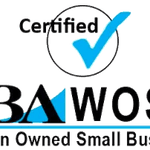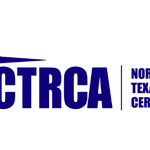ICF Coach Training Programs for Exponential Career Growth
Are you a coach who wants to take the next steps in your career?
Our ICF coach training programs are designed to help you become a better coach and boost your credibility. Becoming an ICF-certified coach means becoming part of a worldwide professional community. It also signals your clients that you work according to set standards and the ICF Code of Ethics, making you more trustworthy as a coach.
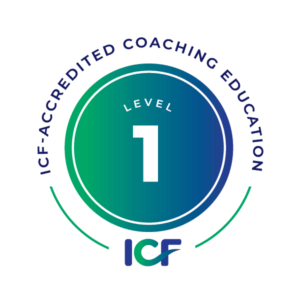
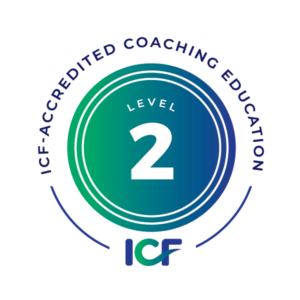
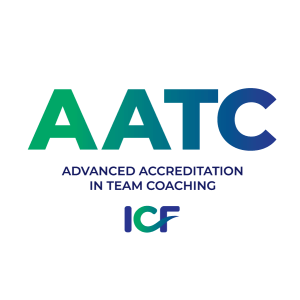
What Do You Get from an ICF Accredited Coach Training Program
The ICF (International Coaching Federation) offers certifications for coaches at various levels, depending on seniority. They range from the basic ACC (Associate Certified Coach) to PCC (Professional Certified Coach) to MCC (Master Certified Coach). At every level, you must complete a comprehensive training program to meet the standard of the ICF (see below for more details).No matter which level you are at, you will always gain:
Coaching Skills
From basic to advanced, you will learn coaching techniques to build a solid foundation for your practice.
Ethical Standards
ICF has strong ethical guidelines that help you to ensure integrity in all your coaching interactions.
Mentor Coaching
Receive guidance and advice from experienced mentors to refine your coaching methods.
Peer Learning
Collaborate with fellow aspiring coaches to learn more and have some fun while you’re at it.
Practical Experience
Collaborate with fellow aspiring coaches to learn more and have some fun while you’re at it.
Continuous Feedback
Get constructive feedback from mentors and peers to improve your coaching proficiency.
Your Individual Executive Coaching Program Unveiled
Our programs are far from one-size-fits-all. Each is meticulously customized to meet our clients’ specific needs, aspirations, and desires. Here’s what you can expect when working with us.

What is ICF Coach Training?
ICF-accredited coach training is a structured program that develops your coaching skills, knowledge, and competencies. It equips you with the expertise needed to help others achieve their goals and unlock their potential.

How is ICF Coach Training delivered?
The ICF-accredited training is delivered through approved institutions, like Tandem Coaching, that meet all the criteria set by the ICF to ensure that all coaches are trained to the same standards. Below, you can find out more about the core competencies taught and the process you go through.

How Do ICF Accredited Coach Training Programs Work?
These programs typically combine theoretical learning, practical coaching experience, and mentorship. You’ll participate in real-time classes, complete self-study assignments, and receive feedback on your coaching techniques from experienced coaches.
The aim is to provide you with a robust set of coaching tools.
Benefits of ICF-Accredited Team Coaching Certification Training
Joining an ICF-Accredited Team Coaching program brings many benefits:

1. Enhanced Skills
You’ll learn specialized coaching techniques that go beyond the basics, equipping you with advanced skills to handle a variety of coaching scenarios. These techniques include effective questioning, active listening, and giving and receiving feedback.

2. Credibility
An ICF certification is respected worldwide, which significantly boosts your professional credibility. This recognition can set you apart in a competitive market, showing that you meet the highest standards of coaching practice.

3. Client Trust
Clients are more likely to trust and hire you if you have a recognized certification. An ICF credential assures clients that you have undergone professional standardized training and stick to ethical guidelines, which builds confidence in your abilities.

4. Networking
During your training, you’ll meet other coaches and experts, allowing you to build a valuable professional network. These connections can lead to collaborative opportunities, knowledge sharing, and support throughout your coaching career.

5. Career Opportunities
This certification can open up new job opportunities and higher-paying roles. Whether you’re looking to work in corporate coaching, life coaching, or another niche, an ICF certification can be a key factor in advancing your career.

6. Resources
Gain access to exclusive ICF resources to keep learning and growing as a coach. These resources include webinars, research, and continuous professional development opportunities that keep you updated with the latest trends and practices in coaching.
List of ICF Coaching Competencies
Here are the core competencies you’ll develop in an ICF-accredited program:
Demonstrates Ethical Practice
Embodies a Coaching Mindset
Establishes and Maintains Agreements
Cultivates Trust and Safety
Maintains Presence
Is fully conscious and present with the client, employing a style that is open, flexible, grounded and confident.
Listens Actively
Evokes Awareness
Facilitates Client Growth
Partners with the client to transform learning and insight into action. Promotes client autonomy in the coaching process.
ICF Coach Certification Process
You Got Questions. Here Are Some Answers.
What Are Some of the Best ICF Coach Training Programs?
The top ICF Coach Training Programs are those that are officially ICF-accredited, like the ones we offer here at Tandem Coaching.
With our ACC and PCC Certification Training, you can be sure to get exactly the skills and knowledge intended by the ICF (International Coaching Federation).
What Are ICF Coaching Certification Requirements?
Each ICF Coaching Certification Program has different specific requirements, depending on the level of certification you would like to attain.
At Tandem Coaching, we offer the ACC Certification Program and the PCC Certification Program.
For ACC, you will need 60 hours of coach-specific education, a minimum of 100 hours of coaching experience, and 10 hours of mentor coaching. Additionally, you will need to pass a performance evaluation and an exam.
For PCC, you will need 125 hours of coach-specific education, a minimum of 500 hours of coaching experience, and 10 hours of mentor coaching. Additionally, you will need to pass a performance evaluation and an exam.
We can help you successfully complete all the requirements on whichever path you choose.
What Are the Different Levels of ICF Coaching Certification?
The ICF offers three primary levels of certification (or ‘credentialing’ as they call it) for coaches:
- ACC – Associate Certified Coach
- PCC – Professional Certified Coach
- MCC – Master Certified Coach
There are additional qualifications that coaches can get through the ICF, like the Advanced Certification in Team Coaching, which we also offer here at Tandem Coaching.
What Career Opportunities are Available after Your ICF Certification?
With an ICF certification, you can become an executive coach, life coach, career coach, and more. This credential opens doors to opportunities in various industries, including corporate, healthcare, education, and personal development.
You will have opportunities to be employed (as an internal coach) or self-employed so that you can work with a wide variety of clients from different walks of life.
